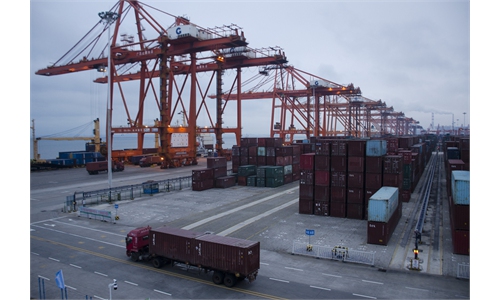China’s imports of bulk commodities slump in first five months but prices go up: customs

An oil tanker is being unloaded at a terminal in Yantai, East China's Shandong Province on May 23, 2022. China imported 171 million tons of crude oil in the first four months of the year, down 4.8 percent, latest official data showed. Photo: VCG
China's imports of bulk commodities from January to May dropped, while witness a significant price rise, newly released data from the General Administration of Customs (GAC) showed on Thursday.
In the first five months of 2022, China imported 95.96 million tons of coal, a year-on-year decrease of 13.6 percent while import prices surged to 1,018.2yuan ($152.38) per ton, up 105.3 percent. And, 44.91 million tons of natural gas was imported, dropping 9.3 percent while prices jumping 70.3 percent.
Meanwhile, a total of 217 million tons of crude oil was imported, down 1.7 percent compared with the same period of 2021, while the price per ton topped 4,463 yuan, or rising 55.6 percent. The import volume for soybeans decreased 0.4 percent to 38.04 million tons with the average price surging 23.3 percent to 4,063.9 yuan per ton.
Analysts noted that the commodities' price surge is primarily impacted by the ongoing Russia-Ukraine conflict.
For instance, the price rise in crude oil is a direct result of the accumulated operational cost from each procedure in the supply chain such as labor cost and logistical cost, Wang Guoqing, research director at Beijing Lange Steel Information Research Center, told the Global Times on Thursday.
As for the reduction of coal imports, Wang noted that the impact from the international market such as the restrictions on Australian coal imports affected import volume.
In response to the soaring commodities prices, Wang added that the country has been implementing measures to stabilize the market, while working on exploring more resources and expanding import channels.
Taking crude oil for instance, China will explore more overseas resources while effectively utilizing domestic oil fields.
The surge in raw material prices is a global issue faced by enterprises across the world, domestic media outlet yicai.com reported, citing Liang Ming, a senior official from the Chinese Academy of International Trade and Economic Cooperation.
The National Development and Reform Commission (NDRC), China's top economic planner, said in May that it would work on ensuring supply and price stability for bulk commodities by guiding the domestic coal price to fluctuate within a reasonable range to stabilize electricity prices.
Meanwhile, the NDRC said it will focus on mineral products to ensure supply and stable prices, while increasing domestic exploration and development of iron ore and speed up the construction of mineral bases to enhance the domestic resource security capacity.
Global Times

